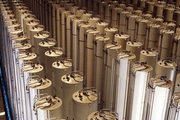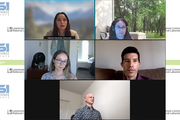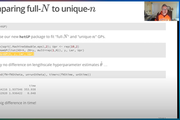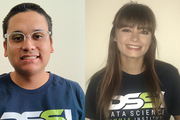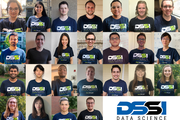Did you know we have a monthly newsletter? View past volumes and subscribe.
LLNL to cooperate with University of Utah's one oneAPI Center of Excellence
Sept. 21, 2022 -
The University of Utah has announced the creation of a new oneAPI Center of Excellence focused on developing portable, scalable and performant data compression techniques. The oneAPI Center will be headed out of the University of Utah’s Center for Extreme Data Management Analysis and Visualization (CEDMAV) and will involve the cooperation of LLNL’s Center for Applied Scientific Computing. It...
S&TR cover story: The ACES in our hand
Sept. 20, 2022 -
Uranium enrichment is central to providing fuel to nuclear reactors, even those intended only for power generation. With minor modifications, however, this process can be altered to yield highly enriched uranium for use in nuclear weapons. The world’s need for nuclear fuel coexists with an ever-present danger—that a nonnuclear weapons nation-state possessing enrichment technology could...
Lab researchers win top award for machine learning-based approach to ICF experiments
Aug. 4, 2022 -
The IEEE Nuclear and Plasma Sciences Society (NPSS) announced an LLNL team as the winner of its 2022 Transactions on Plasma Science Best Paper Award for their work applying machine learning to inertial confinement fusion (ICF) experiments. In the paper, lead author Kelli Humbird and co-authors propose a novel technique for calibrating ICF experiments by combining machine learning with...
An open-source, data-science toolkit for energy: GridDS
Aug. 2, 2022 -
As the number of smart meters and the demand for energy is expected to increase by 50% by 2050, so will the amount of data those smart meters produce. While energy standards have enabled large-scale data collection and storage, maximizing this data to mitigate costs and consumer demand has been an ongoing focus of energy research. An LLNL team has developed GridDS—an open-source, data-science...
Introduction to deep learning for image classification workshop (VIDEO)
July 6, 2022 -
In addition to its annual conference held every March, the global Women in Data Science (WiDS) organization hosts workshops and other activities year-round to inspire and educate data scientists worldwide, regardless of gender, and to support women in the field. On June 29, LLNL’s Cindy Gonzales led a WiDS Workshop titled “Introduction to Deep Learning for Image Classification.” The abstract...
Understanding materials behavior with data science (VIDEO)
Dec. 21, 2021 -
Computational chemist Rebecca Lindsey, PhD, explains how machine learning and data science techniques are used to develop diagnostic tools for stockpile stewardship, such as models that predict detonator performance. Lindsey also describes how atomistic simulations improve researchers’ understanding of the microscopic phenomena that govern the chemistry in materials under extreme conditions...
Building better materials with data science (VIDEO)
Nov. 11, 2021 -
Research engineer Brian Giera, PhD, describes how data science techniques help collect and analyze data from advanced manufacturing processes in order to craft meaningful experiments. With examples of automated microencapsulation, 3D nanoprinting, metal additive manufacturing, laser track welding, and digital twins, Giera explains how interdisciplinary teams apply machine learning to remove...
Building confidence in materials modeling using statistics
Oct. 31, 2021 -
LLNL statisticians, computational modelers, and materials scientists have been developing a statistical framework for researchers to better assess the relationship between model uncertainties and experimental data. The Livermore-developed statistical framework is intended to assess sources of uncertainty in strength model input, recommend new experiments to reduce those sources of uncertainty...
Summer scholar develops data-driven approaches to key NIF diagnostics
Oct. 20, 2021 -
Su-Ann Chong's summer project, “A Data-Driven Approach Towards NIF Neutron Time-of-Flight Diagnostics Using Machine Learning and Bayesian Inference,” is aimed at presenting a different take on nToF diagnostics. Neutron time-of-flight diagnostics are an essential tool to diagnose the implosion dynamics of inertial confinement fusion experiments at NIF, the world’s largest and most energetic...
Former interns share insights during career panel
Aug. 19, 2021 -
The DSI’s new career panel series continued on August 10 with a session featuring former LLNL interns who converted to full-time employment at the Lab. Inspired by the annual Women in Data Science conference, the panel session was open to all LLNL staff and students. Moderator Mary Silva was joined by panelists from the Computing and Engineering Directorates: Brian Bartoldson, Jose Cadena...
Brian Gallagher combines science with service
June 20, 2021 -
Brian Gallagher works on applications of machine learning for a variety of science and national security questions. He’s also a group leader, student mentor, and the new director of LLNL’s Data Science Challenge. The Lab has enabled Gallagher to combine scientific pursuits with leadership positions and people-focused responsibilities. “For a long time, my primary motivation was learning new...
COVID-19 detection and analysis with Nisha Mulakken (VIDEO)
June 7, 2021 -
LLNL biostatistician Nisha Mulakken has enhanced the Lawrence Livermore Microbial Detection Array (LLMDA) system with detection capability for all variants of SARS-CoV-2. The technology detects a broad range of organisms—viruses, bacteria, archaea, protozoa, and fungi—and has demonstrated novel species identification for human health, animal health, biodefense, and environmental sampling...
DSI virtual seminar series debuts on YouTube
May 19, 2021 -
Since launching in 2018, the DSI has hosted more than three dozen speakers in its seminar series. These events invite researchers from academia, industry, and other institutions to discuss their work for an hour to an LLNL audience. In 2020, the series transitioned to a virtual format, and a video playlist of recently recorded seminars is available on the Livermore Lab Events YouTube channel...
Advanced Data Analytics for Proliferation Detection shares technical advances during two-day meeting
May 7, 2021 -
The Advanced Data Analytics for Proliferation Detection (ADAPD) program held a two-day virtual technical exchange meeting recently. The goal of the meeting was to highlight the science-based and data-driven analysis work conducted by ADAPD to advance the state-of-the-art to accelerate artificial intelligence (AI) innovation and develop AI-enabled systems to enhance the United States’...
Virtual seminar series explores data-driven physical simulations
April 6, 2021 -
The rapidly growing fields of artificial intelligence (AI) and machine learning (ML) have become cornerstones of LLNL’s data science research activities. The Lab’s scientific community regularly publishes advancements in both AI/ML applications and theory, contributing to international discourse on the possibilities of these compelling technologies.
The large volume of AI/ML scientific...
Ana Kupresanin featured in FOE alumni spotlight
March 10, 2021 -
LLNL's Ana Kupresanin, deputy director of the Center for Applied Scientific Computing and member of the Data Science Institute council, was recently featured in a Frontiers of Engineering (FOE) alumni spotlight. Kupresanin develops statistical and machine learning models that incorporate real-world variability and probabilistic behavior to quantify uncertainties in engineering and physics...
LLNL physicist wins Young Former Student award
Dec. 16, 2020 -
Texas A&M University’s Department of Nuclear Engineering on December 10 announced it has honored LLNL physicist Kelli Humbird with its 2020-21 Young Former Student award for her work at LLNL in combining machine learning with inertial confinement fusion (ICF) research. Humbird graduated from Texas A&M with a PhD in nuclear engineering in 2019. Since joining the Laboratory as an intern in 2016...
Data Science Institute collaborates with Livermore Lab Foundation and UC Merced to host two year-long fellowships
Dec. 16, 2020 -
Early this spring, the Livermore Lab Foundation (LLF) in partnership with the UC Merced, awarded two rising seniors, Jose Garcia-Esparza and Teagan Zuniga, two one-year $15,000 fellowships to participate in the Lab’s Data Science Summer Institute (DSSI) and continue a part-time fellowship at the Lab for the remainder of the 2020–21 school year.
The fellowships allow deserving students...
After successful virtual summer, DSSI looks ahead to 2021
Dec. 14, 2020 -
In a year distinguished by the COVID-19 pandemic, LLNL’s Data Science Summer Institute (DSSI) pivoted quickly to an all-virtual program. The 28 students in the class of 2020 worked from their homes and attended online seminars, one-on-one mentoring sessions, team-building games, and other activities. Instead of an in-person poster session, the students participated in a virtual Summer Slam...
From intern to mentor, Nisha Mulakken builds a career in bioinformatics
Nov. 3, 2020 -
The COVID-19 pandemic has sparked a wave of new research and development at the Lab, and Nisha Mulakken is very busy. The biostatistician has enhanced the Lawrence Livermore Microbial Detection Array (LLMDA) system with detection capability for all variants of SARS-CoV-2. The technology detects a broad range of organisms—viruses, bacteria, archaea, protozoa, and fungi—and has demonstrated...


